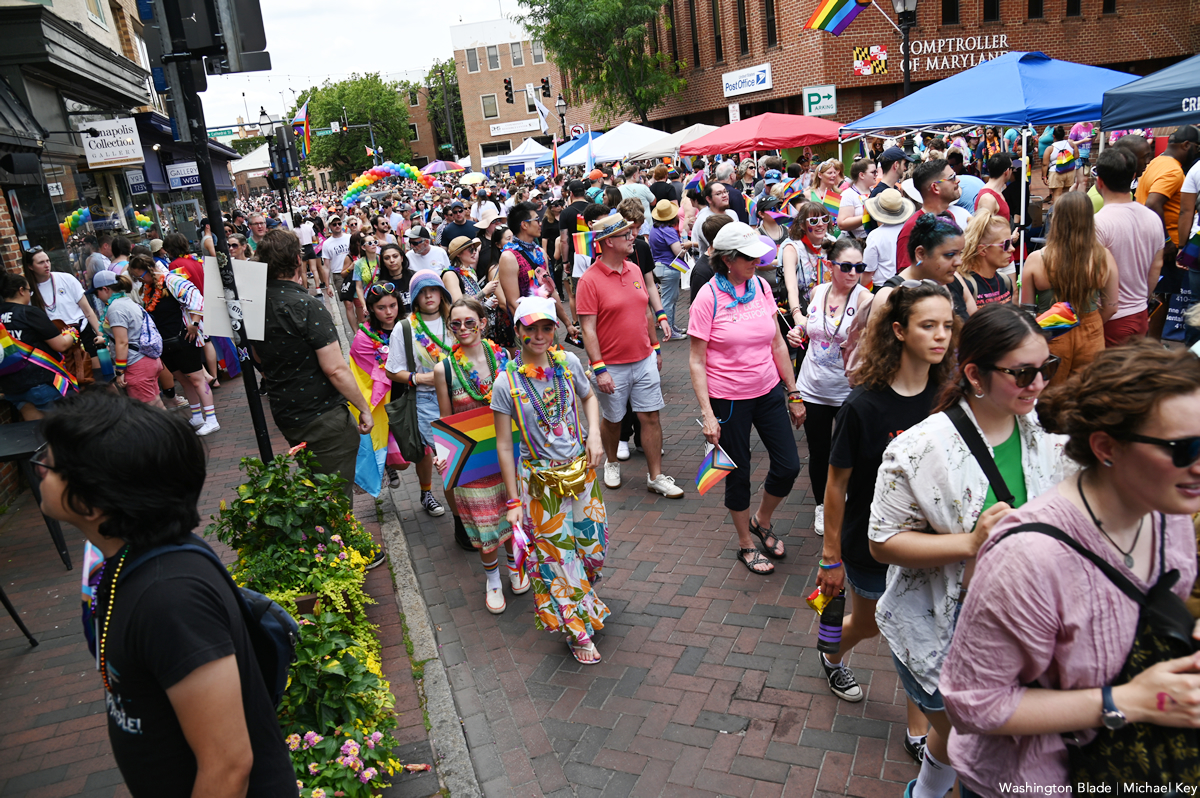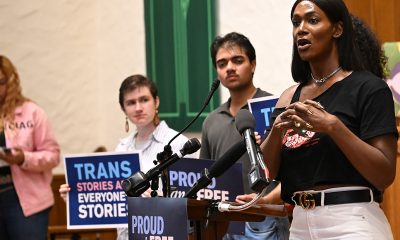Maryland
Bill to repeal Maryland sodomy law dies in committee
‘Perverted Sexual Practice’ measure remains on books for at least one more year

A bill calling for repeal of a Maryland law that classifies oral sex between consenting adults as a crime and that was used to arrest four gay men in an adult video store in May 2021 was approved earlier this year by the state’s House of Delegates but died in a committee of the state Senate.
In a development that disappointed LGBTQ activists and the bill’s sponsors, the Senate Judicial Proceedings Committee failed to act on the bill before the Maryland General Assembly adjourned for the year on April 11.
Sen. William ‘Will’ Smith (D-Montgomery County), who chairs the Democratic controlled committee, said the committee was faced with a large number of bills in a legislative session that lasts only 90 days, and it wasn’t able to get to Senate Bill 22, which called for repealing the state’s Unnatural or Perverted Sexual Practices Act.
“It’s a top priority for me,” Smith told the Washington Blade. “We will get to it next year. It’s just that we ran out of time,” he said. “It wasn’t a lack of willingness. So, I’m working with Sen. Lam to make sure it’s at the top of the agenda next year.”
Smith was referring to State Sen. Clarence Lam (D-Baltimore & Howard County), who introduced the bill in the Senate in January.
Smith said among the other bills that his committee worked on and approved, and that passed both houses of the General Assembly, was the Inclusive Schools Act, which prohibits state funded schools, including private religious schools receiving state funding, from discriminating against students based on their sexual orientation, gender identity, race, nationality, or disability.
Lam told the Blade he is disappointed his bill seeking to repeal the state’s remaining sodomy law did not make it out of the Senate committee. He said he’s hopeful the bill will pass in the General Assembly’s 2023 legislative session.
“My understanding is that it’s not because of policy concerns from the committee leadership,” Lam said in referring to the reason the Senate committee didn’t act on the bill. “I think the fact was they ran out of time to address this issue, which is frustrating because I think this is an important issue,” he said. “And I understand, and I recognize that they have a lot of important issues they’re working with, much of which was very substantive and weighty.”
The Judicial Proceedings Committee’s inability to act on the bill came after the House of Delegates Judiciary Committee approved the measure and sent it to the full House of Delegates, which passed it by a vote of 121 to 10, with one member not voting and nine members absent, according to the bill tracking site LegiScan.
The committee’s failure to act on the bill this year also came two years after it approved a separate bill in 2020 calling for repealing the section of Maryland’s two-part sodomy law that outlawed anal sex. As first introduced, the 2020 bill called for repealing both provisions of the archaic law – the so-called “Sodomy” provision banning anal sex and the Unnatural or Perverted Sexual Practice provision banning oral sex.
But at the request of two Republican members of the committee, Sens. Michael Hough (R-Frederick and Carroll County) and Bob Cassilly (R-Harford County), the committee’s Democratic members and the other two GOP members agreed to drop from the bill the section calling for repeal of the Unnatural or Perverted Sexual Practice provision. The committee consists of seven Democrats and four Republicans.
The full General Assembly then passed the amended bill that repealed only the “sodomy” section of the law during the General Assembly’s 2020 session. The House of Delegates, which initially passed the full two-part bill, agreed to the Senate’s changes. House of Delegates member David Moon (D-Montgomery County), who introduced the 2020 bill in the House, said he and his House colleagues reluctantly agreed to the Senate version because the only alternative was to have no bill at all.
Moon introduced this year’s version of the repeal bill in the House and helped guide it to passage by the full House before the bill died in the Senate committee.
The section of the law that this year’s bill would have repealed and that now remains on the books, states, “A person may not take the sexual organ of another or of an animal in the person’s mouth; place the person’s sexual organ in the mouth of another or of an animal; or commit another unnatural or perverted sexual practice with another or with an animal.”
Supporters of the repeal bill point out that other existing Maryland laws outlaw abusive treatment of animals as well as non-consensual sexual acts or sexual acts between adults and minors. The supporters, including the Office of the Maryland Attorney General, said repealing the Unnatural or Perverted Sexual Practice statute would not prevent the full prosecution of anyone engaging in abuse of animals, rape, or sex with minors.
Many LGBTQ activists were unaware that the repeal bill that passed in 2020 did not include the part of the statute outlawing oral sex. Many did not realize that change had been made to the 2020 repeal bill until the Harford County, Md., Sheriff’s Department conducted a May 20, 2021, raid on the adult Bush River Books & Video store in the town of Abingdon, which is located 25 miles north of Baltimore.
The Sheriff’s Department said one of its deputies, who entered the store undercover in plainclothes, observed what officials said was illegal activity by nine men, who were arrested during the raid. Most were charged with indecent exposure. Four were arrested on the charge of Unnatural or Perverted Sexual Practice.
One of the arrested men told the Blade he and most of the others arrested were caught engaging in sex inside locked video booths that the Sheriff’s deputies opened with keys they obtained from a store employee.
Court records show that the Unnatural or Perverted Sexual Practice charges appear to have been dropped against the four men who were faced with that charge. In response to a request from the Blade, Harford County Deputy State’s Attorney Gavin Patashnick, one of the prosecutors in the case, confirmed that “all perverted practice charges were dropped with no preconditions.”
But the attorneys — and an official with the national LGBTQ litigation group Lambda Legal — said the fact that law enforcement officials would seek to invoke the Unnatural or Perverted Sexual Practice statute was an unfair practice that subjected their clients to an unnecessary burden of an arrest.
Jeremy LaMaster, executive director of the Maryland LGBTQ advocacy group FreeState Justice, said the group engaged in lobbying efforts in support of this year’s repeal bill. He said in the final week of the General Assembly’s legislative session the group urged Smith and the Judicial Proceedings Committee’s vice chair, Sen. Jeff Waldstreicher (D-Montgomery County), to bring the bill up for a committee vote.
“We were advised a few times during the week by both Sens. Waldstreicher and Smith that it would be added to the committee voting list,” LaMaster said in a statement. “We monitored it daily and never saw it appear on a voting list.”
Gay Democratic activist Jeffrey Slavin, who serves as mayor of the Maryland town of Somerset near D.C., said he, too, was disappointed that the repeal bill failed to pass this year.
“There’s really no excuse,” he said. “It’s a no brainer. And there are people who are being harassed needlessly because that law is still on the books. It’s from the last century. It’s ridiculous,” Slavin said, adding, “It’s a shame that this issue isn’t being raised on the campaign trail.”
Montgomery County LGBTQ activist Michael Tardif said he was skeptical about “excuses” of a heavy workload of the Judicial Proceedings Committee and a reported lack of sufficient time to get to the repeal bill.
“This is non-controversial legislation to repeal a heinous, outdated law that is still being used to ensnare LGBTQ people for private, consensual conduct,” he said. “The House Judiciary Committee has the same workload as the Senate Judicial Proceedings Committee and managed to pass the House bill by Feb. 17,” Tardif told the Blade. “’Not enough time’ does not adequately explain why Senate Bill 22 did not even receive a vote in Judicial Proceedings,” he said, referring to the bill number for the repeal measure in question.
Smith told the Blade that because the state Senate has fewer members than the House of Delegates, the Senate committees have fewer members than the House to work on important legislation.
“The Maryland State Senate has four committees,” he said. “The House of Delegates has six. That means each committee in the Senate has 25 percent more jurisdiction over subject matters than each House committee.” He said each House committee has 21 members while each Senate committee has 11 members.
“And although we work feverishly there is no way we can keep up with the pace of the House because that’s by design” of the legislature, he said. “And every subject we go with is extremely serious, and so is this one,” said Smith, referring to the sodomy repeal bill that didn’t make it through his committee this year.
“And as I’ve told you and others, we will get to this bill next year, come hell or high water,” he said.
Maryland
FreeState Justice to lose more than $300K in federal funding
DOJ program funded full-time employees, services for 600 Marylanders this year

FreeState Justice on Monday said it will lose more than $300,000 in federal funding on July 1.
The organization in a press release said the funds from the Justice Department’s Office of Justice Program supported LGBTQ survivors of crime in Maryland. FreeState Justice notes this funding “makes up almost 25 percent of the legal aid organization’s overall budget, and 60 percent of its direct service budget.”
FreeState Justice began to receive funds from the program in 2018.
“FreeState Justice is the only organization providing trauma-informed, culturally relevant legal services to LGBTQ+ Marylanders,” said FreeState Justice Executive Director Phillip Westry. “This funding cut is devastating to our community and the clients we serve, and it undermines the promise of equal justice for all.”
Westry noted the funding supported “2.5 full-time employees on our team of seven.” FreeState Justice Legal Director Lauren Pruitt added upwards of 600 people have benefitted from programs this funding supported so far this fiscal year.
“With our help, our clients report escaping violence, gaining housing, accessing documents, and reclaiming their voice,” said Pruitt. “For years, these funds have helped us to support Marylanders who have survived crimes, including about 600 people so far this fiscal year. Our services empower survivors to define and achieve safety, stability, and justice in the ways that matter most to them.”
“We are calling on the community to step up for Maryland’s LGBTQ+ survivors so that we can continue these essential services,” added Westry. “More than ever, we’ll need their support to continue getting our life-saving resources to those who need them most.”
FreeState Justice notes the Trump-Vance administration has cut $50 million “in grants and funding that support organizations that serve victims of crimes.” Westry on Monday in an email to supporters asked for their support to help fill the funding gap.

Rockville hosted its 9th annual Pride celebration on Sunday.
Organizations and sponsors partnered with the city and its Human Rights Commission to bring the event to life in the Rockville Town Center Park at the Square.
“We want our community to know how safe and how protected they are and that we would support our community,” City Clerk Sara Taylor-Ferrell, who is director of council operations, said. “It’s a gathering for families and friendship; it’s just a good event for our community engagement.”
Taylor-Ferrell said the Rockville community feels safe and comfortable at the event, and she hopes the event will continue to grow bigger each year.
“I think this is going to be a great thing that we can say our legacy is with Pride,” she said.
The Rainbow Youth Alliance, the Episcopal Church of the Ascension, the Barker Adoption Foundation, Maryland Trans Unity, and other organizations gathered along the Square to spread awareness and celebrate the LGBTQ community.
Shane Henise, program director for the Rainbow Youth Alliance, an LGBTQ support group for teens from 13- to 18-years-old, said he wanted to come out and let people know that the organization is there for the younger LGBTQ community.
“I think this is a really hard time for queer and trans youth generally, and we want them to know they have a safe place to come,” he said.
Henise said Pride is more important this year than ever, especially with the “attacks” on gender-affirming care for youth.
“We want to counteract that immense amount of negativity and messages they’re receiving with positivity,” Henise said. “You are who you are. We love you, we support you.”
Speaking in front of a crowd of around 50 people, with hundreds walking around to stop and listen, Mayor Monique Ashton and other City Council members addressed the crowd and highlighted the importance of Pride.
Montgomery County Councilmember Evan Glass said Montgomery County always leads with its heart.
“We, the LGBTQ + community, are under threat and under attack by this president, by the Supreme Court, and while we have our challenges, there is no place I’d rather live than here in Montgomery County,” Glass said to the crowd. “We welcome our neighbors, we love them fairly and justly. We choose to love and we choose to be inclusive. That’s what pride is all about.”
With rainbow flags waving in the town square, attendees stopped by information tables, a clothing pop-up shop, face painting stations and a voter registration table.
Performers took to the stage in between speakers, such as local band the Nighthawks, members of the Rockville Musical Theater and a drag queen from drag story hour who read picture books to children in the crowd.
There was a sense of pride and family at the event, according to Cynethia Williams, the Montgomery County chair of Free Mom Hugs.
“There’s a sense of happiness and excitement about our future, even though it’s super scary right now in America,” Williams said. “It’s great to see that so many people are like, ‘They’re not going to take this stuff from us.’”
As a queer and Black woman, Williams said being at Rockville Pride was a revolution itself.
“I’m a revolter from birth, (from) being in this skin, so just being here is a revolt. It’s time for us to get together and fight,” she said. “Specifically for Free Mom Hugs, we want to make sure that our presence is known, that people know that we’re here and that … there’s a group of people that are ready to cheer them on, hug them, give them love.”
Maryland
Annapolis Pride postponed due to weather
Parade and festival will not happen as scheduled, other events to take place

The annual celebration of the Annapolis LGBTQ community has been put on hold due to forecasted severe weather.
The Annapolis Pride parade and festival, both of which were supposed to take place on May 31, have been postponed until a later date.
Annapolis Pride Board Chair Joe Toolan announced the decision this afternoon, citing information given to the Pride board from emergency management agencies and weather forecasting models.
“The safety of our community comes first,” Toolan said. “Based on guidance from the Annapolis Office of Emergency Management and the National Weather Service, we’ve made the difficult decision to postpone the 2025 Annapolis Pride Parade and Festival due to the very real threat of severe thunderstorms, lightning, and flooding.
“We are hoping to reschedule for some time this fall,” he added.
The National Weather Service has issued tornado and flood watches for large portions of the Mid-Atlantic area, more specifically in areas of Virginia, D.C., and Maryland — including Anne Arundel County where Annapolis is located.
The tornado watch only lasts until midnight, but the impacts of heavy downpours in the area can already be seen where the parade and festival were set to take place. The festival grounds at Bates Middle School are already experiencing flooding and over-saturation, and a flood watch remains in effect with more rain forecast for tonight and tomorrow.
“We are all sad and terribly disappointed that we cannot proceed with the parade and festival on Saturday,” Toolan said. “Hundreds of hours have been spent on planning and coordination, and we were expecting tens of thousands of attendees. But at the end of the day, safety concerns outweigh all other concerns.”
Toolan said the Pride board will announce a rescheduled date as soon as it is confirmed.
Even though the Annapolis Pride parade and festival have been postponed, there are a slew of other planned Pride events that will go on as scheduled:
May 30 – Ladies Night – SOLD OUT
6–10 p.m., Eastport Democratic Club, Annapolis
June 1 – Drag Brunch at Leo – SOLD OUT
10 a.m., Leo Annapolis Restaurant, 212 West St.
June 1 – Ecumenical Pride Worship Service
3 p.m., Eastport United Methodist Church, Annapolis
June 3 – Annapolis Pride Beer Launch
4–7 p.m., Forward Brewing, Annapolis
June 5 – Pride on the Pier
6–9 p.m., Bread and Butter Kitchen, Annapolis
June 6 – Big Gay Dance Party
10 p.m.–close, Tsunami Restaurant, 51 West St., Annapolis
June 7 – Pop-Up Market: Benefiting Annapolis Pride
10 a.m.–3 p.m., Annapolis Town Center
Special discounts @Kendra Scott 6/7–6/8
June 14 – Silent Disco
7–11 p.m., Eastport Democratic Club, Annapolis
June 21 – Teen Dance Party
6–9 p.m., Art Farm, Annapolis
For high school freshmen – juniors
*ticketed event
For more information on the postponement of Annapolis Pride, visit https://annapolispride.org/




















